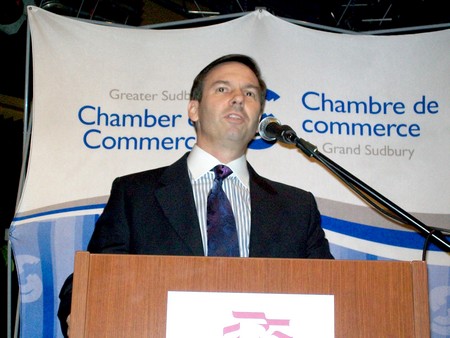 Mining giant Vale is "looking at investments of upwards of $2.5 billion" in Sudbury between now and 2015, according to John Pollesel, chief operating officer for the company's North Atlantic base metals division.
Mining giant Vale is "looking at investments of upwards of $2.5 billion" in Sudbury between now and 2015, according to John Pollesel, chief operating officer for the company's North Atlantic base metals division.
In a speech October 13th to the annual general meeting of the Sudbury Chamber of Commerce, Pollesel revealed plans for an atmospheric emissions reduction project costing between $1.5 and $2 billion."The project is currently in the feasibility stage, with a view to seek approval in late 2011," he told the local business audience. "Construction would begin in early 2012 and be completed in late 2015. If approved, we expect anywhere from 800 to 2,000 workers to be onsite and dedicated to the project."Sulphur dioxide emissions from the company's smelter have already been reduced 90 per cent since 1970. This new emission reduction project will decrease emissions a further 63 per cent to 66 kilotonnes per year, "as mandated by increasingly tough environmental regulations."
Pollesel also announced that the company is "currently embarking on a $200 million investment" to increase recoveries at its Clarabelle Mill in Sudbury.
The so-called CORe project will include the construction of a new building and the deployment of a new flotation system with state-of-the-art technology. This project breaks ground in March 2011 and is scheduled for commissioning in 2012.
Vale put several ambitious mine development projects on the back burner in late 2008 following the downturn of the global economy and the plunge in commodity prices, but to its credit, carried on with the development of Totten Mine, which is due to begin production in late 2011.
Located 35 kilometres west of Sudbury, Totten will be Vale's first new mine in the Sudbury Basin in close to 40 years. Inco sank two shafts at Totten beginning in 1966, but never did any level development and mothballed the property because of low nickel prices in 1972.
Developed at a cost of $360 million, the mine has an expected lifespan of 20 years and will create 130 jobs.
Copper Cliff Deep project
Work on Vale's Copper Cliff Deep project could resume next year following a review of all the numbers, Vale Canada CEO Tito Martins told delegates at the Canadian Institute of Mining and Metallurgy's Maintenance Engineering and Mine Operator's conference in Sudbury October 25th.In July 2008, then president of Vale Inco's Sudbury Operations Fred Stanford told Sudbury Mining Solutions Journal that "the feasibility study is complete and the project is in the final stages of review."
The company spent $45 million on the feasibility study and early execution work, site preparation was being carried out and equipment, including a hoist, was ordered in anticipation of a positive decision.
Pollesel said Vale is committed to continued investment in Sudbury, but warned that "a sustainable, profitable and long-term operation" depends on overcoming a number of challenges.
"We must demonstrate our willingness and ability to become a more productive and efficient operation. Aspiring to the status quo is simply no longer an option," he maintained, claiming that productivity at the company's Ontario operations are "half that of comparable mining operations."
Rising costs, aging assets, declining ore grades and the costs associated with mining at ever greater depths are some of the challenges the company must overcome, said Pollesel.
However, "at a time when significant investments are required to sustain and improve our operations in Ontario, Vale's leading market position bodes very well for Sudbury's long-term future," he added.
Pollesel responded to critics of the company who have accused it of reneging on commitments it made to the Government of Canada when it acquired Inco in 2006 for $17 billion.
"We are in compliance with our undertakings to the Government of Canada and there can be no doubt that a net benefit has been provided as a result of the acquisition," he told the city's business leaders.
"Vale's sustaining capital expenditures in Canada in the three-year post acquisition period from 2007 to 2009 totalled $1.73 billion, more than 45 per cent greater than the corresponding pre-acquisition period.
"In the same period, R&D expenditures were 28 per cent higher, expenditures on employee recruitment, education, apprenticeship and training were 10 per cent higher and exploration expenditures were 159 per cent higher."
Commenting on the bitter strike that shut down operations in Sudbury for close to a year, Pollesel said the company was happy to put it "behind us," and optimistic that the five-year agreement "stands as a turning point in building a successful and sustainable future here in Sudbury."

